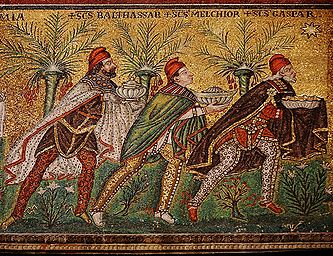Epiphany
Kathy McNeely
January 4, 2015
Sirach 24:1-4, 8-12; Psalms 147:12-13, 14-15, 19-20; Ephesians 1:3-6, 15-18;
Kathy McNeely served as a Maryknoll lay missioner in Guatemala, and worked for many years in the Maryknoll Office for Global Concerns; Epiphany is commemorated on January 6, but in 2015 it is also celebrated on this immediately-preceding Sunday.
How many epiphanies have you had in your lifetime? You know, the sudden, intuitive perception, the “aha” moment when unexpectedly you see into the essential meaning of something. The interesting thing about epiphanies is that they are usually sparked by some everyday occurrence or experience. For me, this is the wonder of epiphanies – I could walk by a thing, a place, or a person at least a hundred times and never see it for what or who it really is. Then suddenly, that everyday object or interaction becomes filled with meaning – a vehicle for revealing God’s presence to me.
This is what it must have been like for the three wise men we associate with this feast. They followed a star that brought them to a family struggling to make a newly born child comfortable in a structure more suitable for animals than for people. At that time and even today – we know that women are giving birth to children in homes, shacks and lean-tos that are not fit for human dwelling. Yet, instead of turning around and going back home, the wise men, through epiphany, are able to see deeper meaning in this scene. Indeed, they are the first to embrace the radical truth about the infant Jesus.
Today’s readings challenge us to see that epiphanies – these moments of sudden insight—are always available to us. John’s gospel posits that wisdom, insight, and God’s word are ever-present in the world. In fact, they exist and have existed throughout history; they were even present before the world came into being. Wisdom, insight and revelation come directly from God and are the way in which God involves Godself in the world. Today’s reading from the gospel of John reveals how difficult it is for many people to access God’s epiphanies. God’s word through John the Baptist’s announcing the coming of God’s chosen one was not recognized by many who heard it. “He was in the world, and the world came into being through him; yet the world did not know him.” (John 1:10)
I was drawn to mission because I wanted to accompany people who live at the margins, to learn from that experience and to proclaim a new, more just way of living – to do my part in bringing more equity to human relationships. In the municipality where I lived, I accompanied families and individuals through childbirth, illness, celebrations, family deaths and marriages. The more I walked with them, the more I came to appreciate that for the Maya Q’eqchi’, the very ground upon which we walk is sacred. This insight, or epiphany, which changed the way I relate to God, to others and to the world, came to me when I participated in my first Mayehak, a ceremony to prepare for planting.
Late in the evening several of us from the parish went out to the field where corn and beans were to be planted the next day. We walked with one of the elders, Juan, who dug four holes in the four corners of the field. In each hole, he placed a piece of cooked chicken, a tortilla, some chocolate drink and some incense. He was “feeding” the earth. Through this ritual the entire community was making an offering to the earth and asking permission to break open its surface to plant. When the ceremony was completed we accompanied Juan back to his home where several people were charged with staying up all night praying that the seeds would bear all that was needed to nourish the community. Through this experience I began to see a history of unbalanced relationship that humans have with the earth as clearly as I been able to see inequity in human relationships.
Previously I thought I cared about the earth more than most people. I knew it was bad to litter and I recycled cans, bottles and paper long before it became common place in most cities, but I had never thought that much of my relationship with the earth. The real “aha” moment for me came in recognizing during the Q’eqchi’ experience that I am part of the earth rather than seeing earth at my disposal to do with as I please. I had believed like many people do, that society and economics function independent of the environment rather than seeing them as subsets of the eco-system.
The Q’eqchi’, however, never lost sight of that important relationship. As much as possible they seek harmony with the natural world through their relationship with the earth. They give the earth the care, respect and even the food earth needs; and they ask permission to take the fruits of their labor at harvest time. For this “aha” moment I am grateful. I now struggle (as I am certain John the Baptist did) to find ways to make this reality known to a world where social and economic structures push us toward higher and higher levels of economic growth while the earth suffers through symptoms of resource depletion, pollution, holes in the ozone, climate change and many more signs of stress.
In today’s reading from the book of Sirach we hear the voice of Wisdom, speaking in the first person and proclaiming that wisdom’s dwelling place is with the people of Israel. John’s gospel reaffirms that Wisdom, insight existed before all ages and through all ages and never ceases to be. As this new year begins, let us pray for God’s wisdom, insight and presence to break through to help us discover new ways of being in the world so that there is a world to relate to for generations to come.

